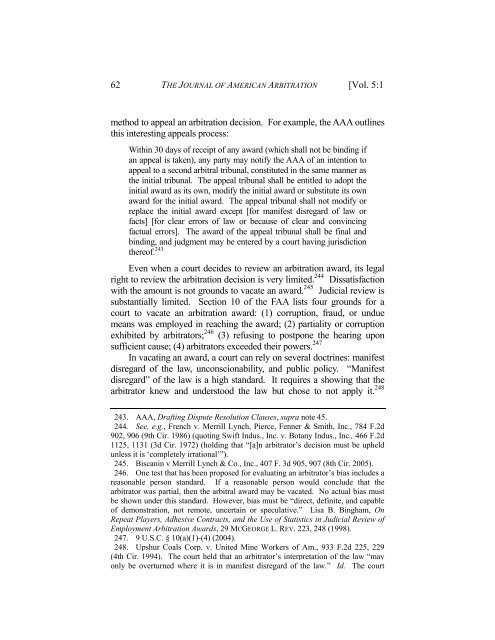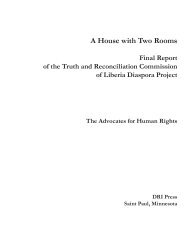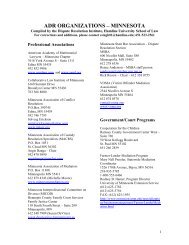2006/Vol. 5 No.1 - Hamline Law - Hamline University
2006/Vol. 5 No.1 - Hamline Law - Hamline University
2006/Vol. 5 No.1 - Hamline Law - Hamline University
Create successful ePaper yourself
Turn your PDF publications into a flip-book with our unique Google optimized e-Paper software.
62 THE JOURNAL OF AMERICAN ARBITRATION [<strong>Vol</strong>. 5:1<br />
method to appeal an arbitration decision. For example, the AAA outlines<br />
this interesting appeals process:<br />
Within 30 days of receipt of any award (which shall not be binding if<br />
an appeal is taken), any party may notify the AAA of an intention to<br />
appeal to a second arbitral tribunal, constituted in the same manner as<br />
the initial tribunal. The appeal tribunal shall be entitled to adopt the<br />
initial award as its own, modify the initial award or substitute its own<br />
award for the initial award. The appeal tribunal shall not modify or<br />
replace the initial award except [for manifest disregard of law or<br />
facts] [for clear errors of law or because of clear and convincing<br />
factual errors]. The award of the appeal tribunal shall be final and<br />
binding, and judgment may be entered by a court having jurisdiction<br />
thereof. 243<br />
Even when a court decides to review an arbitration award, its legal<br />
right to review the arbitration decision is very limited. 244 Dissatisfaction<br />
with the amount is not grounds to vacate an award. 245 Judicial review is<br />
substantially limited. Section 10 of the FAA lists four grounds for a<br />
court to vacate an arbitration award: (1) corruption, fraud, or undue<br />
means was employed in reaching the award; (2) partiality or corruption<br />
exhibited by arbitrators; 246 (3) refusing to postpone the hearing upon<br />
sufficient cause; (4) arbitrators exceeded their powers. 247<br />
In vacating an award, a court can rely on several doctrines: manifest<br />
disregard of the law, unconscionability, and public policy. “Manifest<br />
disregard” of the law is a high standard. It requires a showing that the<br />
arbitrator knew and understood the law but chose to not apply it. 248<br />
243. AAA, Drafting Dispute Resolution Clauses, supra note 45.<br />
244. See, e.g., French v. Merrill Lynch, Pierce, Fenner & Smith, Inc., 784 F.2d<br />
902, 906 (9th Cir. 1986) (quoting Swift Indus., Inc. v. Botany Indus., Inc., 466 F.2d<br />
1125, 1131 (3d Cir. 1972) (holding that “[a]n arbitrator’s decision must be upheld<br />
unless it is ‘completely irrational’”).<br />
245. Biscanin v Merrill Lynch & Co., Inc., 407 F. 3d 905, 907 (8th Cir. 2005).<br />
246. One test that has been proposed for evaluating an arbitrator’s bias includes a<br />
reasonable person standard. If a reasonable person would conclude that the<br />
arbitrator was partial, then the arbitral award may be vacated. No actual bias must<br />
be shown under this standard. However, bias must be “direct, definite, and capable<br />
of demonstration, not remote, uncertain or speculative.” Lisa B. Bingham, On<br />
Repeat Players, Adhesive Contracts, and the Use of Statistics in Judicial Review of<br />
Employment Arbitration Awards, 29 MCGEORGE L. REV. 223, 248 (1998).<br />
247. 9 U.S.C. § 10(a)(1)-(4) (2004).<br />
248. Upshur Coals Corp. v. United Mine Workers of Am., 933 F.2d 225, 229<br />
(4th Cir. 1994). The court held that an arbitrator’s interpretation of the law “may<br />
only be overturned where it is in manifest disregard of the law.” Id. The court
















